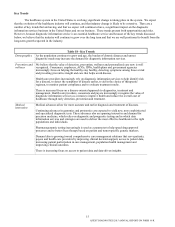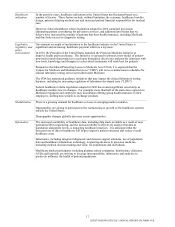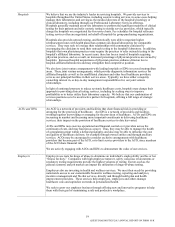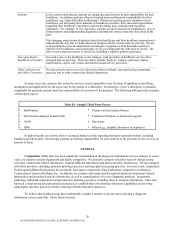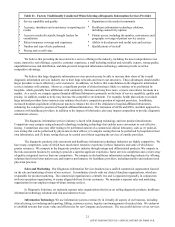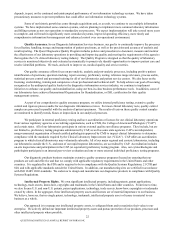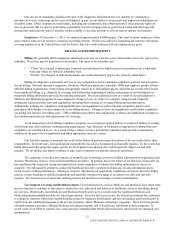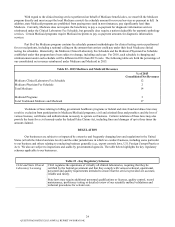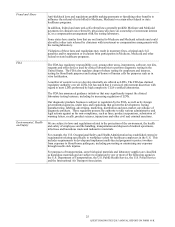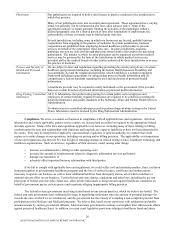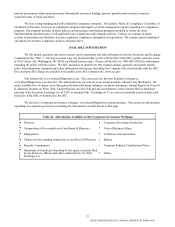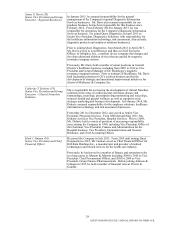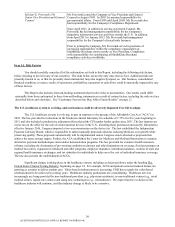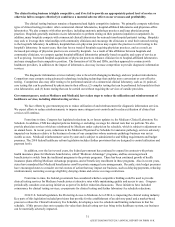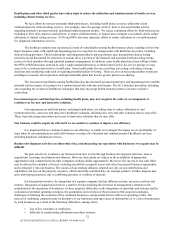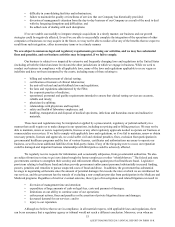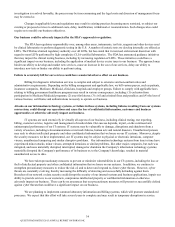Quest Diagnostics 2015 Annual Report Download - page 28
Download and view the complete annual report
Please find page 28 of the 2015 Quest Diagnostics annual report below. You can navigate through the pages in the report by either clicking on the pages listed below, or by using the keyword search tool below to find specific information within the annual report.
24
With regard to the clinical testing services performed on behalf of Medicare beneficiaries, we must bill the Medicare
program directly and must accept the local Medicare carrier's fee schedule amount for covered services as payment in full. In
addition, state Medicaid programs are prohibited from paying more (and in most instances, pay significantly less) than
Medicare. Currently, Medicare does not require the beneficiary to pay a co-payment for diagnostic information services
reimbursed under the Clinical Laboratory Fee Schedule, but generally does require a patient deductible for anatomic pathology
services. Certain Medicaid programs require Medicaid recipients to pay co-payment amounts for diagnostic information
services.
Part B of the Medicare program contains fee schedule payment methodologies for clinical testing services performed
for covered patients, including a national ceiling on the amount that carriers could pay under their local Medicare clinical
testing fee schedules. Historically, the Medicare Clinical Laboratory Fee Schedule and the Medicare Physician Fee Schedule
established under that program have been subject to change, including each year. For 2016, each schedule is changing and
reimbursement under each schedule will be different in 2016 than 2015 levels. The following table sets forth the percentage of
our consolidated net revenues reimbursed under Medicare and Medicaid in 2015.
Table 22 - 2015 Medicare and Medicaid Revenues
% of 2015
Consolidated Net Revenues
Medicare Clinical Laboratory Fee Schedule 12
Medicare Physician Fee Schedule 2
Total Medicare 14
Medicaid Programs 3
Total Traditional Medicare and Medicaid 17
Violations of laws relating to billing government healthcare programs or federal and state fraud and abuse laws may
result in: exclusion from participation in Medicare/Medicaid programs; civil and criminal fines and penalties; and the loss of
various licenses, certificates and authorizations necessary to operate our business. Certain violations of these laws may also
provide the basis for a civil remedy under the federal False Claims Act, including fines and damages of up to three times the
amount claimed.
REGULATION
Our businesses are subject to or impacted by extensive and frequently changing laws and regulations in the United
States (at both the federal and state levels) and the other jurisdictions in which we conduct business, including some particular
to our business and others relating to conducting business generally (e.g., export controls laws, U.S. Foreign Corrupt Practices
Act). We also are subject to inspections and audits by governmental agencies. The table below highlights the key regulatory
schemes applicable to our businesses.
Table 23 - Key Regulatory Schemes
CLIA and State Clinical
Laboratory Licensing CLIA regulates the operations of virtually all clinical laboratories, requiring that they be
certified by the federal government and that they comply with various technical, operational,
personnel and quality requirements intended to ensure that the services provided are accurate,
reliable and timely.
State laws may require additional personnel qualifications or licenses, quality control, record
maintenance, proficiency testing or detailed review of our scientific method validations and
technical procedures for certain tests.
QUEST DIAGNOSTICS 2015 ANNUAL REPORT ON FORM 10-K



